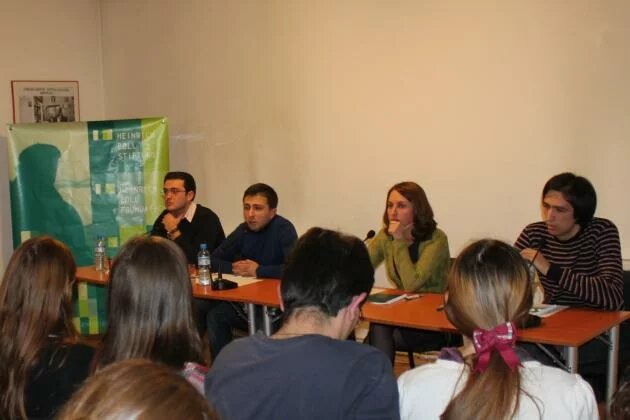
Speakers:
- Dachi Gubadze, Head, Student Self-Government, Tbilisi State University after Ivane Javakhishvili;
- Ilia Goglidze, President, Student Self-Government, Ilia State University;
- Levan Abashidze, Member, Laboratory 1918.
Moderator: Nino Robakidze, Journalist, HBF 2011 Fellow.
What is a function of student’s self-governance, how student self-government bodies are elected, what is a duration of the elected self-government bodies, how the functions of the student self-governments differ from each other at various Georgian universities, what is a rate of trust in this institution, what are major problems students in Georgia face and how the student self-government bodies support students in solving these problems, what was the reason for establishing an alternative student movement – these were some of the issues discussed during the debate held at the HBF on 14 December 2011.
Dachi Gubadze, the chairman of the Student Self-Government at the Tbilisi State Univeristyafter Ivane Javakhishvili(TSU),began his speech by stressing out legitimacy of the student self- government at the TSU. According to Gubadze, the student self-government is the only legitimatestudent organization elected by a secret ballot. Correspondingly, it has the highest degree of legitimacy and the right to speak on behalf of all TSU students.
Dachi Gubadze underlined 4 main directions of the work for student self-governments: Organization of sport and cultural activities, excursions and implementation of educational and scientific projects. The priority for the student self-government of third convention is implementation of educational projects. Therefore, a big portion of the funds from the university budget was used for financing such projects. “Probably, all of you are interested in hearing criteria for selecting projects and events for funding, the easiest way for determining the worthiness of the project is the number of students involved in it.”
Ilia Goglidze, the president of Student Self-Government at the Ilia State University (Iliauni), discussed goals and objectives of the organization, which according to him, are protection of students’ rights and interests, provision of support to students in increasing civic activeness and assistance in solving their administrative and/or academic problems. During the last 3 years the priority of the student self-government at the Iliauni has been to provide funding for socially vulnerable students.
Levan Abashidze,the member of the Laboratory 1918, an alternative student movement, talked aboutthe reasonsfor establishing the movement and its vision. He disagreed with Dachi Gubadze that the priority of the TSU student self-government is to organize educational events.
However, the representatives of student self-governments and members of the Laboratory 1918 agreed on several important issues: To put efforts for decreasing tuition fees from 2250 GEL to 1500 GEL and to allocate more funds for educational and scientific projects.
Oliver Reisner from the European Union Delegation in Georgia raised the issue concerning the Bologna Process, to which Georgia joined in 2005. The process focuses on students’ active participation in improving learning process at high education institutions. Mr. Reisner was interested if students really had chances to evaluate quality of lectures. He also underlined an importance to organize discussions inside universities.
Gubadze answered the question by Reisner. According to him, in the past, they conducted several surveys among students to evaluate administrative and academic staff. Although, one of the TSU students present in the hall commented that such surveys are only formalities and not much is changed in a reality.
The fact that the auditorium was overcrowded with guests certainly indicates that the issue of student self-government and in general of higher education is very critical to many in Georgia. Furthermore, it illustrates that students have problems and wish to discuss them openly. It should be also stressed that attendance at the debate of students supporting the TSU Student Self-Government was well-organized.
In any case, organization of the debate was timely and important. The representatives of Laboratory 1918 and student self-governments understood that their visions and opinions on different issues are not as divergent as they would have previously imagined.